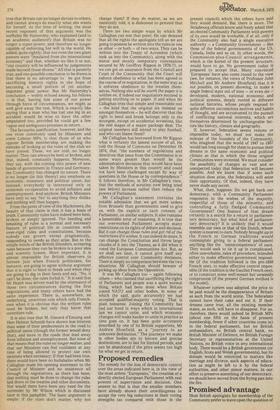Proposed remedies
The remedy for the loss of democratic control over the areas indicated here is, in the view of ' the most ardent "Europeans," the creation of a directly elected European Parliament with real powers of supervision and decision. One answer to that is that the smaller members have already shown their unwillingness to accept the very big reductions in their voting strengths (as compared with those in the present council) which the others have said they would demand. But there is more The Strasbourg officials know and freely admit that an elected Community Parliament with powers of its own would be workable, if at all, only if the Community also had a single executive authority — a Community Government — like those of the federal governments of the US, Canada, India and so on. In other words, the Commission-plus-Council arrangements> which is the kernel of the present structure, would have to go. No government today is prepared to accept that. Many convinced 'Europeans' have also come round to the view (see, for instance, the views of Professor John Mitchell and Mr Andrew Shonfield) that it is not possible, on present showing, to make a single federal state out of nine — or even six — developed, modern, national economic and political systems, deeply rooted in different national histories, whose people respond to quite different unconscious motives and habits of thought, and are accustomed to the pursuit of conflicting national interests, which are themselves determined by unchangeable factors like history, climate and geography.
If, however, federation seems remote or impossible today, we must not make the mistake of .the founders of the Community, who imagined that the world of 1947 to 1957 would last long enough for them to pursue their dreams in the same economic and political climate as that in which the three original Communities were invented. We must consider the possibility of changes so vast and so unexpected today that federation will become possible. And we know that if some such situation does arise, the federalists will seize their opportunity. Of that, indeed, they have never made any secret.
What, then, happens: Do we get back our democracy, with a Community Parliament responsive to the wishes of the majority, respectful of those of the minority, and controlling a fully fledged Community Government? One feature of that dream certainly is a search for a return to parliamentary democracy, but what kind of parliamentary democracy? It is unlikely that it would resemble our own or that of the Dutch, whose system is nearest to ours. Nobody brought up in the French or German traditions would contemplate giving to a federal parliament anything like the 'omnicompetence' of ours. They would seek to tie it up in complicated, often unworkable, rules of procedure, intended either to make effective government impossible (if the tradition followed is the pre-1958 French one), to make effective control impossible (if the tradition is the Gaullist French one), or to construct some well-meant but unwieldy compromise (if the present German method is the model).
Whatever system was adopted, the price to be paid would be the disappearance of Britain as such from the world scene. The federalists cannot have their cake and eat it. If their dreams came true, all the existing member states, as such, will have to disappear. For us, therefore, there would indeed be British MPs (about one fifth on the basis of present membership, fewer if other countries come in) in the federal parliament, but no British ambassadors, no British central bank, no British Minister of Defence, no British Foreign Secretary or representatives at the United Nations, no British voice in any international body. There would be a British government (or English, Scots and Welsh governments), but its domain would be restricted to matters like marriage and divorce, such aspects of education as might be left to it by the federal authorities, and other minor matters. In our effort to preserve something of our democracy, we should have moved from the frying pan into the fire.










































 Previous page
Previous page